1791

Vermont's first United States senator, Moses Robinson of Bennington, took his seat and repeated the oath of office. Four days later, on November 4, Vermont's second senator, Stephen Bradley of Westminster, was sworn in.
1791

Senators Moses Robinson and Stephen Bradley of Westminster drew lots to determine class assignments. Robinson drew Class 1, with a term to expire in 1797. Bradley drew Class 3, with a term to expire in 1795. Bradley returned to the Senate in 1801 and served another 13 years. He was the longest-serving Vermont senator until 1883.
1802
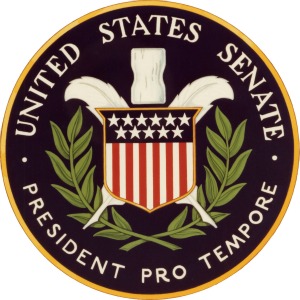
The Senate elected Stephen Bradley as its president pro tempore. A biographer later described Bradley as an "able, hard-working senator whose ready wit and boundless store of amusing anecdotes made him popular with his colleagues."
1816
Dudley Chase of Randolph became the first chairman of the Senate Committee on the Judiciary.
1854

The Senate ruled that appointed senator Samuel Phelps of Middlebury was not entitled to retain his seat. He had been appointed to the Senate on January 17, 1853, but the state legislature had twice met and failed to elect a successor. The question was whether an appointment expires when the legislature next meets, or only when the legislature elects a successor.
1855

Jacob Collamer of Woodstock, an attorney, began his service in the Senate. For most of his Senate term Collamer also served as the last president of Vermont Medical College at Woodstock.
1861

The Senate elected Solomon Foot of Rutland president pro tempore. He held that post through the darkest months of the Civil War. Foot died on March 28, 1866.
1862
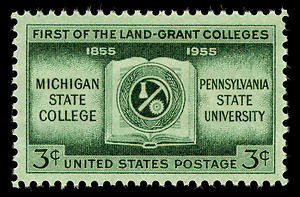
President Lincoln signed the Morrill Land Grant Act, sponsored by Senator Justin Morrill of Strafford, which set aside federal lands to create colleges to “benefit the agricultural and mechanical arts.”
1866
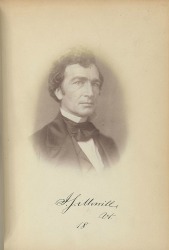
In the years following the Civil War, as service in the Senate became more attractive, the seniority of Vermont's delegation soared. George Edmunds of Burlington served from this day in 1866 to November 1, 1891, a total of 25 years, 6 months, and 30 days. Justin Morrill held his seat from 1867 to 1898, a total of 31 years, 9 months, and 25 days. Edmunds' and Morrill's service records would not be broken for almost 50 years.
1867

George Edmunds, former speaker of the Vermont house and president of the state senate, chaired the committee to develop rules to govern President Andrew Johnson's Senate impeachment trial. (He subsequently voted to remove Johnson from office.) During his 25-year Senate career, Edmunds carried on a profitable private law practice, arguing cases before federal courts, including the Supreme Court.
1869
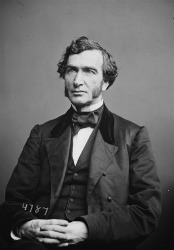
Justin Morrill began his eight-year chairmanship of the Senate Committee on Public Buildings and Grounds. In that capacity, he promoted a major redesign of the Capitol's grounds and a separate building for the Library of Congress.
1872
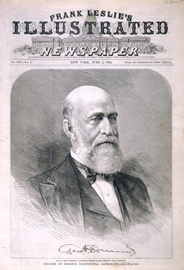
George Edmunds became chairman of the Senate Committee on the Judiciary, serving until 1879 and again from 1881 to 1891.
1876
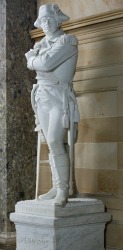
Congress accepted a marble statue of Ethan Allen sculpted by Larkin G. Meade, as Vermont's first contribution to the National Statuary Hall Collection.
1881

Congress accepted a marble statue of former senator Jacob Collamer sculpted by Preston Powers as Vermont's second contribution to the National Statuary Hall Collection.
1883

The Senate elected George Edmunds as its president pro tempore, a position Edmunds held until 1885.
1885
Senator George Edmunds was elected Republican Conference chairman, a position he held until 1891.
1890
The Senate passed the Sherman Antitrust Act, outlawing trade and commercial restraints imposed by trusts and monopolies. As chairman of the Senate Committee on the Judiciary, George Edmunds amended the measure to ensure its enactment.
1895

Redfield Proctor of Proctor became chairman of the Senate Committee on Agriculture and Forestry (today's Committee on Agriculture, Nutrition, and Forestry), serving until March 3, 1907.
1898
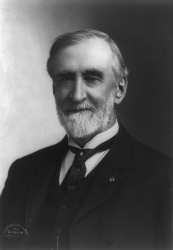
Senator Redfield Proctor delivered a speech on the Senate floor on the conditions in Cuba, following an observation visit there. His remarks helped swing American opinion in favor of war with Spain to secure the island's independence.
1898

Senator Justin Morrill died. At the time of his death, he had chaired a major Senate committee—the Committee on Finance—for 17 years, longer than anyone in history, setting a record that still stands for that committee. He served in the Senate for 31 years, 9 months, and 25 days, and held the record for longest-serving Vermont senator until George Aiken surpassed him in 1941.
1907

A commission to investigate all aspects of U.S. immigration policy elected Senator William Dillingham of Montpelier as its chairman. The Dillingham Commission’s 41-volume report, published in 1911, presented vast statistical studies touching on many aspects of the immigrant experience. The report set the foundation for restrictive immigration policies, including the national origins quotas, and influenced policymakers into the 1960s.
1913
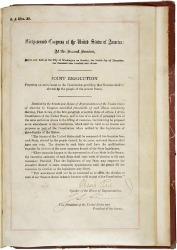
The Seventeenth Amendment to the U.S. Constitution went into effect, allowing the election of U.S. senators by popular vote. Vermont's first directly elected senator was William Dillingham, who won reelection in 1914.
1935
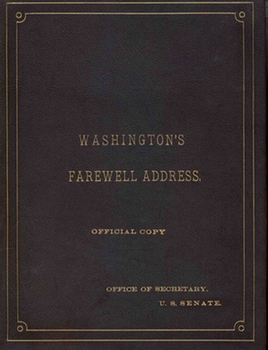
Senator Warren Austin of Burlington read George Washington's 1796 Farewell Address on the floor of the Senate, a tradition dating to 1862.
1946

Senator Warren Austin resigned from the Senate to accept President Harry Truman's appointment as the first U.S. representative to the United Nations' Security Council. He served until 1953.
1953
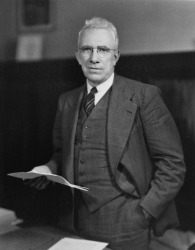
George Aiken of Putney became chairman of the Senate Committee on Agriculture and Forestry (today's Committee on Agriculture, Nutrition, and Forestry), serving until December 2, 1954.
1954

Senator Ralph E. Flanders of Springfield read George Washington's 1796 Farewell Address on the floor of the Senate, a tradition dating to 1862.
1954

Responding to constituent concerns about the divisive tactics of Wisconsin senator Joseph R. McCarthy, Vermont senator Ralph E. Flanders delivered the first of many speeches denouncing the injustices of McCarthy's hunt for subversive activity in the government. Flanders, a farmer and self-taught industrial economist, led his New England Republican Senate colleagues in the Senate's condemnation of the excesses of the Wisconsin senator.
1963

Senator Winston L. Prouty of Newport read George Washington's 1796 Farewell Address on the floor of the Senate, a tradition dating to 1862.
1975

George Aiken's nearly 34-year tenure in the Senate ended with his retirement. Until 2008 Aiken was Vermont’s longest-serving senator.
1981

Robert T. Stafford of Rutland became chairman of the Senate Committee on Environment and Public Works, serving until January 26, 1987.
1987
Patrick Leahy of Burlington became chairman of the Senate Committee on Agriculture, Nutrition, and Forestry, serving until December 1, 1994.
1997
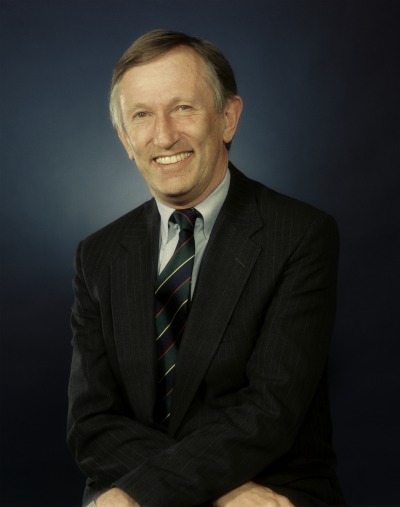
James Jeffords of Shrewsbury became chairman of the Senate Committee on Labor and Human Resources, which became the Committee on Health, Education, Labor, and Pensions in 1999. He served as chair until 2001.
2001

Patrick Leahy became chairman of the Senate Committee on the Judiciary during the 107th Congress. He served as chairman briefly from January 3 to January 20, at which time the Republicans took control of the Senate. Control changed back to the Democrats in June when Vermont senator James Jeffords left the Republican Party and began to caucus with the Democrats. Leahy chaired from 2001 to 2003, and again from 2007 to 2015.
2001
Senator James Jeffords announced his intention to leave the Republican Party and to take on status as an Independent, but to caucus with the Democratic Party. His change ended the Senate's historic 50-50 split and, when it took effect on June 6, shifted the floor leadership and committee organization to the Democratic Party. This was the first time in Senate history that party control shifted in mid-session.
2001

James Jeffords became chairman of the Senate Committee on Environment and Public Works, a position he held until January 14, 2003.
2008
Senator Patrick Leahy of Burlington became Vermont’s longest-serving senator to date, surpassing George Aiken's record of 33 years, 11 months, and 24 days. He went on to serve a total of 48 years and is the third longest-serving senator in Senate history.
2012

Senator Patrick Leahy was elected president pro tempore of the Senate, a position he held until January 6, 2015, when he became president pro tempore emeritus. He again became president pro tempore on January 20, 2021, serving until his retirement on January 3, 2023.
2013

Bernard Sanders of Burlington became chairman of the Senate Committee on Veterans' Affairs, serving until 2015.
2023
Bernard Sanders became chairman of the Senate Committee on Health, Education, Labor, and Pensions, a position he held until January 7, 2025.